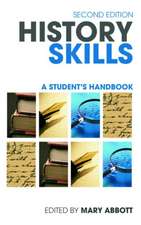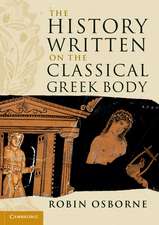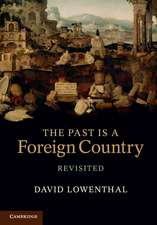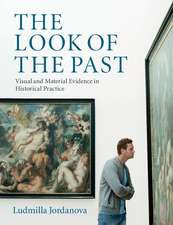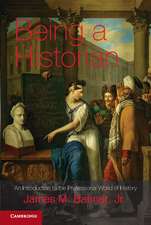Psychology and History: Interdisciplinary Explorations
Editat de Cristian Tileagă, Jovan Byforden Limba Engleză Paperback – 16 dec 2015
| Toate formatele și edițiile | Preț | Express |
|---|---|---|
| Paperback (1) | 287.07 lei 6-8 săpt. | |
| Cambridge University Press – 16 dec 2015 | 287.07 lei 6-8 săpt. | |
| Hardback (1) | 727.72 lei 6-8 săpt. | |
| Cambridge University Press – 19 feb 2014 | 727.72 lei 6-8 săpt. |
Preț: 287.07 lei
Nou
Puncte Express: 431
Preț estimativ în valută:
54.93€ • 57.50$ • 45.72£
54.93€ • 57.50$ • 45.72£
Carte tipărită la comandă
Livrare economică 31 martie-14 aprilie
Preluare comenzi: 021 569.72.76
Specificații
ISBN-13: 9781316502846
ISBN-10: 1316502848
Pagini: 324
Ilustrații: 8 b/w illus.
Dimensiuni: 152 x 230 x 16 mm
Greutate: 0.44 kg
Editura: Cambridge University Press
Colecția Cambridge University Press
Locul publicării:Cambridge, United Kingdom
ISBN-10: 1316502848
Pagini: 324
Ilustrații: 8 b/w illus.
Dimensiuni: 152 x 230 x 16 mm
Greutate: 0.44 kg
Editura: Cambridge University Press
Colecția Cambridge University Press
Locul publicării:Cambridge, United Kingdom
Cuprins
Foreword Kenneth J. Gergen; Introduction: psychology and history - themes, debates, overlaps, and borrowings Cristian Tileagă and Jovan Byford; Part I. Theoretical Dialogues: 1. History, psychology and social memory Geoffrey Cubitt; 2. The incommensurability of psychoanalysis and history Joan Wallach Scott; 3. Bringing the brain into history: behind Hunt's and Smail's appeals to neurohistory Jeremy Burman; 4. The successes and obstacles to the interdisciplinary marriage of psychology and history Paul Elovitz; 5. Questioning interdisciplinarity: history, social psychology and the theory of social representations Ivana Marková; Part II. Empirical Dialogues: Cognition, Affect and the Self: 6. Redefining historical identities: sexuality, gender, and the self Carolyn Dean; 7. The affective turn: historicising the emotions Rob Boddice; 8. The role of cognitive orientation in the foreign policies and interpersonal understandings of Neville Chamberlain, Winston Churchill, and Franklin Delano Roosevelt, 1937–41 Mark E. Blum; 9. Self esteem before William James: phrenology's forgotten faculty George Turner, Susan Condor and Alan Collins; Part III. Empirical Dialogues: Prejudice, Ideology, Stereotypes and National Character: 10. Two histories of prejudice Kevin Durrheim; 11. Henri Tajfel, Peretz Bernstein and the history of Der Antisemitismus Michael Billig; 12. Historical stereotypes and histories of stereotypes Mark Knights; 13. Psychology, the Viennese legacy and the construction of identity in Yugoslavia Cathie Carmichael; Conclusion: barriers to and promises of the interdisciplinary dialogue between psychology and history Cristian Tileagă and Jovan Byford.
Recenzii
'An engaging volume exploring potentials and problems in relating psychology and history, drawing on recent developments in discursive and critical psychology. Looming in the background is the Holocaust with efforts to understand it intellectually, politically and personally.' William McKinley Runyan, University of California, Berkeley and author of Psychology and Historical Interpretation and Life Histories and Psychobiography
'This is a very welcome collection of rich and in-depth explorations of just how, and why, psychologists need to see their research as historically and culturally contextualised, rather than pursuing 'universals'. These papers, by leading figures in the field, also show how truly innovative cross-disciplinary work can be, generating new questions as well as new solutions.' Helen Haste, Harvard Graduate School of Education and University of Bath
'This is a very welcome collection of rich and in-depth explorations of just how, and why, psychologists need to see their research as historically and culturally contextualised, rather than pursuing 'universals'. These papers, by leading figures in the field, also show how truly innovative cross-disciplinary work can be, generating new questions as well as new solutions.' Helen Haste, Harvard Graduate School of Education and University of Bath
Descriere
Exploring the relationship between psychology and history, this book considers how the disciplines could benefit from a closer dialogue.


